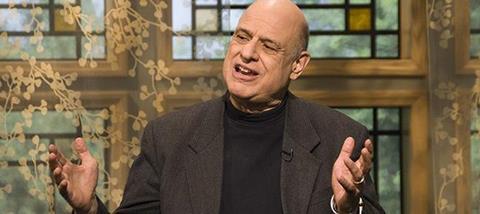Last year Tony Campolo announced he had no theological objection to gay relationships. In this extract from our Profile interview, the veteran evangelical tells Sam Hailes the reasons for his change of mind

What made you change your mind on homosexuality?
One of the things that changed me was going back and studying [biblical] verses, studying the Church Fathers. I found that they said very little about it, if anything at all. Jesus, of course, never even mentions it, which is interesting.
If there’s one passage that gay people feel they’re clobbered with, it’s out of the first chapter of Romans: “They take the image of the incorruptible God, they transform him into the image of corruptible man and the four-footed beast and birds of the air, and they end up worshipping the creature rather than the creator. Therefore God has given them up to uncleanness, men having sex with men, women having sex with women” [Romans 1:23-27].
What Paul is doing is tying this homosexual behaviour that he’s talking about with idolatry. If you read that passage carefully, it says they gave up their natural affections. The homosexuals say, “You don’t get it, Campolo, my natural affection was never heterosexual. My natural affection was homosexual.” So as I began to review scripture, I began to say, “Wait a minute, maybe this isn’t as strong a condemnation as I think it is. Maybe he’s condemning obscenities that were related to idolatry rather than loving relationships between two persons.”
I know all the arguments pro and con. I’ve thought of everything, and I’m still open to considering new things when somebody has something new to say. Having said all of that, I just meet too many wonderful Christian people who are in gay relationships, and I know this: my own marriage has been an incredible relationship. If I was to ask what has been the greatest influence in nurturing me as a Christian, I would have to say it’s my wife. I then ask myself a very simple question: can I deny homosexual couples what I am personally experiencing in the way of blessings and joy in a relationship?
That became the basis for my final decision. I just knew too many couples who were living out the Christian life, who were committed to the work of the kingdom and who were in edifying relationships.
Suicide is the second major cause of death among teenagers in America, second only to automobile accidents. Almost three-quarters of those suicides are suicides by Christian young people who cannot reconcile their sexual orientation with what they’re hearing from the pulpit. I don’t know what the Church is about, but if it’s about driving kids to suicide it’s not doing the right thing.
So there are biblical reasons. But more importantly – and this is not the way in which theology should be formed – I just see so many Christian young people being hurt.
It’s interesting that you admit that’s not the way biblical theology should be formed, but nevertheless that’s the direction you’ve gone in…
That’s what a sociologist does. We call ourselves phenomenologists. It means that you step outside of yourself and look at yourself as a sociologist should. So I hear all my rhetoric, but I’m always saying, “But what’s really going on here?” I’ve been appalled by the number of gay people who have been driven away from Christianity, who have given up on God because of the way in which the Church has related to them.
By and large, those on both sides of this debate – including those on the conservative side – acknowledge that the way the Church has treated gay people has been horrific…
They have to do one thing more. They have to accept what scientific research has demonstrated: that people do not choose to be gay. Southern Baptists in the United States are convinced that gay is chosen.
Yes, but in the UK, many of the arguments I hear are from people who may well accept that. They would just say that, in the same way that you or I would have sinful desires, we would resist those.
I think it’s a good position.
And of course you used to hold it yourself. So you understand where these people are coming from…
And I understand why the first chapter of Romans is interpreted differently than the way in which I just interpreted it. But I do have to say it’s been painful for me to step back and make this statement, because I’ve lost my community, I feel alone. I feel stranded out there.
And I’m saying, “Where do I belong? Do I belong with these other people who are so liberal in their theology that I can’t really identify with that because I believe in the Bible and I believe in Jesus and I believe in the doctrines of the Apostles’ Creed? And on the other hand, I don’t want to be over here.” So I find myself in a no-man’s land, and that’s a very painful thing for me.
Click here read the full interview, which includes Tony's views on the upcoming US election




































